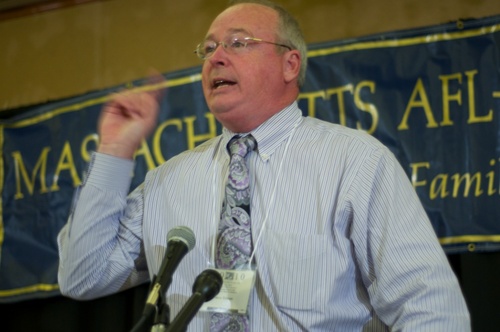Boston Teamster-Violence Trial to Begin July 31

Union czar Steven Tolman: The Teamster defendants’ alleged crimes are “deeply problematic,” but “may not be prosecuted under the Hobbs Act,” because the defendants sought to achieve “legitimate union objectives.” Image: Steven A. Tolman Twitter account
On July 31, a federal extortion trial of four Boston Teamster union operatives is set to begin. It is expected to last roughly two weeks.
Union henchmen John Fidler, Michael Ross, Robert Cafarelli, and Daniel Redmond are accused of threatening and assaulting the cast and crew of the Emmy Award-winning TV reality show Top Chefthree years ago during a shoot in Milton, Mass., a southern suburb of Boston.
U.S. v. Fidler is an important case that Big Labor has tried to use to widen  the loophole for extortionate union violence in the federal Hobbs Act opened up by the U.S. Supreme Court nearly 45 years ago in its controversial 5-4 Enmons decision. The Hobbs Act normally prohibits actual or attempted extortion, i.e. the obtaining of things of value through threats or force, when it affects interstate commerce.
Moreover, nearly all Americans would agree that, if the accused Beantown union militants did what they are charged with having done, they should be convicted of violating the Hobbs Act. But not Teamster lawyers and their allies in the AFL-CIO hierarchy, who tried to derail the case permanently last year.
Union lawyers and officials have said again and again that the alleged actions of the defendants “may not prosecute under the Hobbs Act,†because the defendants sought to achieve “legitimate labor ends†through their thuggery.
Just what are the alleged actions of the Fidler defendants that even their well-wishers concede are “deeply problematic�
Prosecutors have charged that, at Milton’s Steel and Rye restaurant, where the shoot occurred, some of the defendants assaulted crew members “in an attempt to forcibly enter the restaurant.†One Teamster goon allegedly trampled an elderly security guard, while others blocked deliveries. The union radicals are said to have hurled “homophobic and racial slurs†at the production crew.
And when Top Chef host Padma Lakshmi arrived on the set, Fidler allegedly reached into her vehicle and threatened, “I’ll smash your pretty little face.†(See the news story linked below for additional information.)
Prosecutors contend the Top Chef shoot in Milton was violently disrupted because producers had refused to hire unneeded union labor for the filming. In September 2016, U.S. Magistrate Judge Marianne Bowler agreed with the prosecution that the services for which Teamster operatives were seeking to be paid were indeed “unwanted, unnecessary, and superfluous . . . .â€
In such cases, declared the judge, Enmons, which exempted threats, vandalism, and violence perpetrated to secure “legitimate†union objectives from Hobbs Act prosecutions, does not apply. Consequently, she rejected the defendants’ motion to get the charges against them dismissed and allowed the case to proceed.
Massachusetts union bosses are apoplectic about the possibility that the understanding that Enmons precludes Hobbs prosecutions for violence against nonstriking employees of unionized businesses, but allows prosecutions for violence against union-free businesses, will become settled law. If that happens, warns Massachusetts AFL-CIO chief Steven Tolman, it will have a “chilling effect†on union organizing activity.
Fortunately for Tolman and his cohorts, but unfortunately for advocates of law and order, under the trial rules set by Senior U.S. District Judge Douglas Woodlock, who is now presiding over Fidler, jurors may vote for acquittal if they believe the Teamster defendants had “legitimate union objectives.â€
Enmons-based acquittals in Fidler would have serious consequences. The union-violence exemption could apply to many more cases than it currently does.’
But Right to Work supporters are fighting back. Currently, National Right to Work Committee staffers are asking several Capitol Hill allies to introduce legislation that would overturn Enmons and hold union bosses who orchestrate threats, vandalism, and violence, regardless of their exact purpose, accountable under the Hobbs Act.
(In previous Congresses, such legislation, known as the Freedom from Union Violence Act, was sponsored by U.S. Sen. David Vitter of Louisiana. But Vitter retired in January.)
Because Enmons was a matter of statutory, rather than constitutional, interpretation, Congress retains the power to reverse it legislatively. Moreover, that’s exactly what grassroots Right to Work supporters are fighting for.

